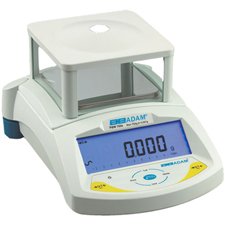Description
The Adam Equipment PGW conventional, or precision, top-loading balance offers precision weighing results. It has a two-second settling time that allows for increased productivity, an external calibration system, to verify accurate results, and a capacity tracker for visual reference to forestall the balance from being overloaded. The built-in time and date function enables work in compliance with good practices in many industries, including food and pharmaceutical. The integrated RS-232 port connects to a printer or computer for manual or automatic recording of weighing and calibration data.
The balance has a backlit digital display, weighs in as much as 18 different units, including one programmable custom unit (models with a readability of 0.001g have 18 units of measurement; models with a readability of 0.01g have 17 units of measurement), and can display or print text in four languages: English, French, German, or Spanish. The application modes include check weighing (with buzzer option), percent weighing, dynamic weighing with programmable parameters, parts counting, and net/total. Security passcodes may also be employed to safeguard against mode and settings alteration, whilst the imbedded security slot works with a lock and cable to verify balance placement. The durable die-cast aluminum housing protects the internal weighing cell from environmental influences and affect, and the stainless-steel weighing pan is corrosion resistant and easy to scrub. Adjustable non-slip rear feet provide level measurements and stability, so the balance won’t tip under eccentric quite a bit. The included below-balance weighing hook suspends bulky items beneath the balance for weighing.
Balances are measuring instruments used to decide the mass of an object, whilst scales are used to measure the load of an object. The measurement results from balances are most often thought to be to be more precise in comparison to results from scales. Mechanical balances are the most straightforward form of balance, and use a lever and slide to suggest the measurement. Conventional balances are often utilized in offices, the jewellery industry, and in kitchens, and display results digitally, but are less precise than analytical balances. Analytical balances measure to a high degree of precision and accuracy (0.0001g or better), and display results digitally. These balances have a cover with doors to forestall dust and airflow from affecting the measurement. Moisture balances analyze moisture content in a material sample, the usage of infrared or halogen heat sources to dry the sample after which calculate the moisture content from the before- and after-drying weight, and display results digitally, at the balance, or transfer the guidelines for display on a pc.
Adam Equipment manufactures balances, scales, and related accessories for laboratory, educational, industrial, retail, and medical applications. The company, which was once founded in the UK in 1972 and has an place of work in Danbury, CT, meets International Organization for Standardization (ISO) 9001:2008 standards.
Conventional top-loading balance provides precision weighing results
Two-second settling time for increased productivity
Stainless steel weighing pan is corrosion resistant and easy to scrub
Powered by the included AC adapter
Integrated RS-232 port for recording data manually or routinely
